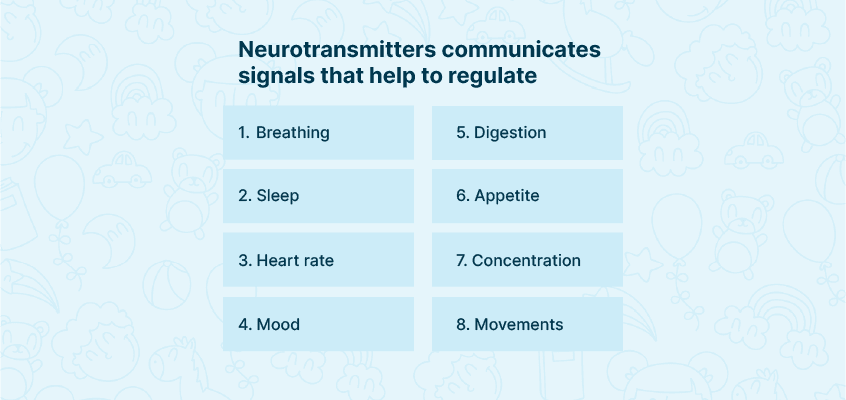Introduction:
The human brain is a complex structure. It has billions of neurons that smoothly communicate a message from one part to another. Neurotransmitters are the chemical messengers that relay signals between neurons. Studies show that neurotransmitters and mental disorders such as depression and anxiety strongly correlate.
Our Wellness Programs
Looking for services related to this subject? Get in touch with these experts today!!
Experts

Banani Das Dhar

India
Wellness Expert
Experience: 7 years

Shariha

India
Psychologist
Experience: 8 years

Preethi Jain

India
Psychologist
Experience: 15 years

Devika Gupta

India
Wellness Expert
Experience: 4 years
What are neurotransmitters?
In the human brain, neurons communicate with each other with the help of chemical messengers. The neural ends of any two neurons are not connected. These neurons have a tiny gap known as the synaptic gap, where neurotransmitters in chemicals carry signals to other target cells. In simple words, neurotransmitters are the chemical that helps to relay the message between neurons to target cells. These messages help to regulate body functions.
Neurotransmitters play a crucial role in the process of communicating signals that help to regulate:
1. Breathing
2. Sleep
3. Heart rate
4. Mood
5. Digestion
5. Appetite
6. Concentration
7. Movements
Neurotransmitters are of three types; each of them has a specific receptor.
Types of neurotransmitters:
1. Excitatory Neurotransmitter: These types of neurotransmitters excite and encourage target cells.
2. Inhibitory: These types of neurotransmitters discourage the target cells and inhibit their action.
3. Modulatory: These types of neurotransmitters communicate with multiple neurons at once.
What are depression and anxiety?
Depression and anxiety are common mental disorders that adversely affect your life. Both of these mental disorders create hindrances in your work and personal life.
Depression:
It is also known as major depressive disorder or mood disorder. Depressed individuals show signs of constant unhappiness, sadness, and loss of interest in their lives. Pessimism is at the core of depression. It causes symptoms such as,
1. The feeling of worthlessness or hopelessness
2. The feeling of constant sadness
3. Suicidal thought content
4. Lack of interest in any activity
5. Fatigue
6. Disturbed sleep
7. Loss of appetite
8. Inability to focus or make decisions
The condition of depression may not completely go away. However, with proper treatments, one can manage the symptoms of depression.
Anxiety:
Feeling anxious is common when faced with a challenging or threatening event. However, long-lasting feelings of anxiety can point towards anxiety disorders. In the face of challenge or threat, humans feel stress and use fight, flight, or freeze mechanisms. Anxiety affects your mental as well as physical health. Fear can make stressors look bigger than they are. Individuals with anxiety disorders face out of proportion feelings of anxiety. The symptoms of anxiety include:
1. Constant restlessness
2. Disturbed sleep cycle
3. Excessive sweating of palms and feet
4. Shortness of breath
5. Fear and phobia
6. Dizziness
7. Dryness in mouth
8. Feeling panic
How do neurotransmitters impact depression and anxiety?
Changes in neurotransmitters are one of the many factors that lead to depression and anxiety. Certain neurotransmitters are responsible for regulating mood. Studies suggest that low levels of certain neurotransmitters such as dopamine and serotonin may cause depression and anxiety.
Dopamine and anxiety: What does dopamine have to do with fear?
Research shows that depression has links with Dopamine, but the latest scientific studies suggest that it may play a key role in anxiety-related behaviours. Typically dopamine is associated with pleasure addictive behaviours. However, sometimes fear has relations with dopamine levels. Fear and phobia are a part of many anxiety disorders such as phobia, social anxiety, generalised anxiety, PTSD. While fear contributes to the dopamine level, it also contributes to anxiety-like behaviour.
The role of dopamine in depression, anxiety, and other conditions:
Dopamine is a critical neurotransmitter that takes part in regulating mood. Changes in levels of dopamine can cause mood disorders. Depression is also a mood disorder caused by fluctuation in dopamine. The brain releases dopamine while engaging in pleasurable activities. Low levels of this pleasure-causing neurotransmitter can lead to depression, while excessive amounts of dopamine can contribute to aggression, impaired impulse control, hyperactivity, ADHD.
Some studies suggest that hyperactivity and excess dopamine are associated with schizophrenia, delusions, and hallucinations. Some Parkinsons’ patients also have excess amounts of dopamine in their bodies. Excess dopamine can promote addiction gambling tendencies in a person.
The role of serotonin in depression, anxiety, and other conditions:
Serotonin is a neurotransmitter that causes us to feel good or happy—individuals with low levels of serotonin experience anxiety-related problems. Apart from regulating mood, this neurotransmitter also regulates gut functions. There is a large amount of serotonin in the gut; Serotonin is a mood regulator and happiness inducer and plays a vital role in depression treatments.
Low serotonin levels may affect your mood, sleep cycle disturbance, feeling of chronic pain, anger problems, memory issues, and more. Whenever you experience a severe allergy, your body secretes serotonin. It also plays a crucial part in pain management.
However, an excessive amount of serotonin may badly affect your blood pressure and heartbeat. Studies suggest regular mindfulness meditation can improve your serotonin levels and lift your mood.
Conclusion:
Serotonin and dopamine are essential neurotransmitters that impact your overall well-being.
A daily exercise routine, meditation, nutritional diet can help to balance these neurotransmitters. Practising gratitude is also a way to balance serotonin. You can also consult a therapist to deal with anxiety or depression.
















